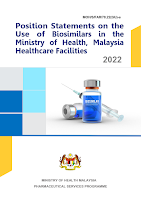Biosimilars
Introduction
Biological medicines are medicines that are made by or derived from a biological source using biotechnology processes, such as recombinant DNA technology.
- The size and complexity of biological medicines, as well as the way they are produced, may result in a degree of natural variability in molecules of the same active substance, particularly in different batches of the medicine. This variation is maintained within strict acceptable limits.
- Examples of biological medicines include insulins and monoclonal antibodies.
A biosimilar medicine is a biological medicine that is highly similar and clinically equivalent (in terms of quality, safety, and efficacy) to an existing biological medicine that has already been authorised (commonly referred to as the "reference molecule").
- Once the patent for a biological medicine has expired, a biosimilar medicine may be authorised.
- The cost savings associated with biosimilars development include shorter time to market, abbreviated clinical trials, low risk of product failure, and improvement of biosimilar production and analytical methods.
Different from Generic Medicine
A biosimilar medicine is not the same as a generic medicine, which contains a simpler molecular structure that is identical to the originator medicine.
- The active substance of a biosimilar medicine is similar, but not identical to the originator biological medicine.
Current Market
Prescribing
Biological medicines must be prescribed by brand name and the brand name specified on the prescription should be dispensed in order to avoid inadvertent switching.
Automatic substitution of brands at the point of dispensing is not appropriate for biological medicines (EXCEPT for few approved interchangeable products by FDA).- Similar to the Orange Book, The Purple Book is the go-to resource developed by the FDA for pharmacists and other health care providers interested in making an interchange between a reference biologic and a biosimilar.
Malaysia
As the use of biological medicines including biosimilars is increasing in the Ministry of Health, Malaysia, a position statement is published in 2022 to act as a guidance to the use and handling of biosimilars.
External Links
- FDA - Biosimilars
- American Cancer Society - What are Biosimilar Drugs?
- SPS - Understanding biological and biosimilar medicines, 2022
- What Are Biosimilars?, 2023
- Purple Book: Lists of Licensed Biological Products with Reference Product Exclusivity and Biosimilarity or Interchangeability Evaluations, 2020
- Australia TGA - Biosimilar medicines regulation
- Guidance Document and Guidelines for Registration of Biosimilars in Malaysia
- NPRA Malaysia - Biosimilars Approved
- Position Statements on the Use of Biosimilars in the Ministry of Health, Malaysia Healthcare Facilities, 2022


Comments
Post a Comment